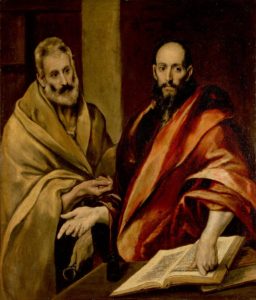Feast of St. Peter and St. Paul, Apostles
June 29
The Lord be with you
 The feast of St. Peter and St. Paul is probably the oldest of the saints’ observances (dating from about the middle of the third century). An early tradition held that these two pillars of the New Testament Church were martyred on the same day in Rome during the persecution under Nero (emperor 54-68). In addition to this joint commemoration of their deaths, both apostles are commemorated separately: Peter on January 18 for his confession of Jesus as the Christ (Matthew 16:13-16) and Paul on January 25 for his conversion (Acts 9:1-19).
The feast of St. Peter and St. Paul is probably the oldest of the saints’ observances (dating from about the middle of the third century). An early tradition held that these two pillars of the New Testament Church were martyred on the same day in Rome during the persecution under Nero (emperor 54-68). In addition to this joint commemoration of their deaths, both apostles are commemorated separately: Peter on January 18 for his confession of Jesus as the Christ (Matthew 16:13-16) and Paul on January 25 for his conversion (Acts 9:1-19).
The New Testament tells us much about both apostles. Peter was with Jesus from the beginning of His ministry and served as a leader among the disciples. Despite his steadfast faith, Scripture also records some of his failures, such as his rebuke of Jesus (Matthew 16:21-23) and his threefold denial of his Lord (Matthew 26:69-75). Following Jesus’ ascension, Peter continued as a leader in the Church (Acts 1:15; 21:14; 15:7).
Paul, a devout Jew also known as Saul, entered the scene as a persecutor of the Church. Following his miraculous conversion, in which the risen Christ Himself appeared to him, Paul became a powerful preacher of the grace of God. During his three missionary journeys (Acts 13-14; 16-18; 18-21), Paul traveled throughout modern-day Turkey and Greece. The New Testament account of his life ends with Paul under house arrest in Rome (Acts 28:16), though some traditions holds that he went on to Spain before returning to Rome. As far as post-conversion faults of Paul, only one stands out to me. That would be the unforgiving spirit demonstrated when he refused to take John Mark along with him on his second missionary journey because he had “withdrawn from them (Barnabas & Paul) in Pamphylia and had not gone with them to the work” (Acts 15:36-41). Many commentaries seek to justify Paul’s actions, no doubt because of the great work he did and we just don’t like to see the feet of clay our heroes have, but I believe this has been recorded to accent that all, even the great Saint Paul, was a sinner and needed to live in the grace of God found in Jesus Christ, our Lord. Apparently Paul had a change of heart, recognizing his sin and repenting, being reconciled with Mark (2 Timothy 4:11). To his credit, Mark clearly did not hold a grudge but forgave Paul. Mark also was a great blessing to Peter (1 Peter 5:13).
Tradition holds that, when Peter was to be martyred, the Romans were going to crucify him. Peter demurred, saying he was unworthy to die in the same fashion as his Lord. The Romans obliged and crucified him upside down. Paul, as a Roman citizen, could not legally be crucified. So he was beheaded.
With these two great Apostles we see the whole Jewish and Gentile mission of the Church, for Peter was primarily taking the Gospel to the Jews while Paul primarily took the Gospel to the Gentiles (Galatians 2:7). This, of course, doesn’t mean that they didn’t preach to all people. They took advantage of all opportunities to share Christ given to them by the Lord.
Prayer: Merciful and eternal God, Your holy apostles Peter and Paul received grace and strength to lay down their lives for the sake of Your Son. Strengthen us by Your Holy Spirit that we may confess Your truth and at all times be ready to lay down our lives for Him who laid down His life for us, even Jesus Christ, our Lord, who lives and reigns with You and the Holy Spirit, one God, now and forever. Amen.
Other appropriate prayers:
• For the spread of the Gospel to both Jews and Gentiles
• For the continuation of the apostolic zeal and spirit
• For those who are today’s martyrs
Blessings in Christ,
Pastor John Rickert
